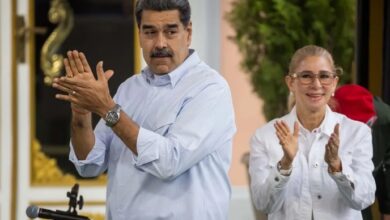Venezuelan Maduro’s First 100 Days of Tension Scrutinized

Reaching the milestone of 100 days into his disputed third term, Venezuelan President Nicolás Maduro grapples with unrelenting legitimacy challenges, new sanctions, and the forced return of thousands of migrants—many of them deported from the United States—to Latin American territory.
Legitimacy Concerns and International Reactions
Nicolás Maduro’s newest period as president started January 10. This start occurred with dispute surrounding it. Complete electoral results have not been made public. This is unlike normal practices in Venezuela. It also makes people suspect that someone changed the vote counts. Critics contend that the partial information made public is insufficient to confirm Maduro as the undisputed winner, with some opposition groups claiming the real victor was Edmundo González Urrutia.
Nicolás Maduro’s newest period as president started January 10. This start occurred with dispute surrounding it. Complete electoral results have not been made public. This is unlike normal practices in Venezuela. It also makes people suspect that someone changed the vote counts.
The domestic dispute has an equally pronounced global dimension. Powerful nations such as Russia, China, Iran, and Turkey continue to back Maduro’s government, praising his administration for what they label as resistance to foreign interference. Many countries, including the United States, Canada, and several Latin American nations, contest the legal foundation of his mandate. The governments claim Maduro’s leadership lacks legitimacy because the electoral process did not fulfill fundamental democratic criteria.
Maduro’s government consistently objects to what it views as unjustified international meddling. Government officials in Caracas declare that Venezuela is undergoing a planned effort to create instability. This effort attacks its national independence because international criticism increases. The split between the two countries became wider. Washington placed more severe penalties and limits on Venezuelan oil buys. It also placed tariffs on various Venezuelan products when Donald Trump’s presidency started again.
In fiery speeches, Maduro insists that “no threat in the world will intimidate Venezuela” and recently declared a state of economic emergency, portraying U.S. sanctions as a direct assault on national stability. Among his measures to counter perceived aggression, his government issued a travel advisory for citizens visiting the United States, cautioning them about possible risks.
Migration Challenges and Prospects for Elections
Migration has taken center stage throughout Maduro’s first 100 days of this contentious term. Authorities report that over 2,500 Venezuelans returned home between February and early April, most of them deported from the United States. This figure includes multiple flights from U.S. territory following an agreement negotiated after a Trump administration envoy visited Caracas.
The Venezuelan government condemns what it calls a “civilizational aggression” against its migrants. This rhetoric intensified when the United States deported over 200 alleged members of the Tren de Aragua, a criminal network Washington has labeled a terrorist entity. Caracas rejects the accusation that these individuals are part of an organized Venezuelan criminal group, asserting that the deportations constitute collective punishment.
Maduro declared a series of future elections, covering both lawmaking bodies plus local offices, to solidify his control. Local and national assembly voting dates are set for May 25. This schedule produced division inside the opposition. Some groups advocate taking part in voting to challenge the government’s hold on power. But others refuse to participate – they claim the ruling party intends to rig the outcome.
A possible change to the constitution adds to political instability. The attorney general in Venezuela leads a group that writes changes to the constitution. Maduro declares the changes are needed for “national renewal.” However, critics view this action as a way for his government to secure its control over the country. Maduro states the reform project will go to a public vote after the commission has completed its ideas.
Economy, Human Rights, and the Esequibo Dispute
Venezuela’s economic woes also dominate headlines. Between January and mid-April, the bolívar has depreciated by more than 30% against the U.S. dollar on the official exchange market. The dollar’s rise—from roughly 54 bolívares at the start of this term to over 80—has placed additional strain on a population already contending with soaring prices for everyday goods.
Essential items have become more expensive as the “black market” exchange rate exceeded 100 bolívares per dollar. Economists observe that the extensive use of the dollar in domestic transactions has contributed to higher price levels. Independent organizations state the country had inflation increases over ten percent in the first quarter of the year.
Labor unions have stepped up their protests to demand a higher minimum wage, which now stands at $1.60 per month, excluding small public-sector bonuses. Independent sources estimate that individuals need about $100 each month to purchase basic groceries, which shows a significant gap compared to the official wage.
Human rights problems remain during Maduro’s time in office. Family members of political prisoners staged many demonstrations. They wanted freedom for the prisoners plus spoke out against what they saw as unfair imprisonments. Although the number of people jailed for political motives reportedly dropped compared to earlier in the year, activists claim that oppressive measures persist—particularly regarding access to legal counsel, visitation rights, and medical treatment for imprisoned individuals.
Adding to the array of issues is a rekindled territorial dispute over the Esequibo region, a resource-rich area of roughly 160,000 square kilometers claimed by both Venezuela and neighboring Guyana. The Maduro administration’s suggestion to “elect for the first time a governor” of the Esequibo infuriated Georgetown, which petitioned the International Court of Justice (ICJ) for urgent measures to dissuade Caracas from holding elections on the contested land. Venezuela states it possesses valid historical demands. It contends Guyana worked together with ExxonMobil to take advantage of sea areas under discussion.
This incident highlights Maduro’s combative stance toward international affairs. Although disagreements have grown with the United States and other countries, Caracas has disputes with neighboring Guyana. Caracas wants to reaffirm Venezuelan national identity. In Maduro’s eyes, these moves serve as a demonstration of strength to both domestic and international observers. Critics, however, see them as strategic deflections from acute economic hardship and growing popular discontent at home.
Maduro finds himself at a decisive point early in his third term with many days remaining. Supporters celebrate his fight for sovereignty against what they see as unfair interference from major international powers. Critics maintain his rule continues to drive Venezuela into solitude from democratic nations through ongoing authoritarian practices.
Also Read: Ecuador’s Noboa Achieves Electoral Victory as Leftists Call for Election Recount
The real test may yet come with the multiple elections slated for this year, which could reveal the depth of Maduro’s support—or the extent of voter distrust. In a political landscape rocked by sanctions, displaced migrants, territorial conflict, spiraling inflation, and ongoing questions about democratic legitimacy, the spotlight remains on whether his administration can forge a more stable future. For millions of Venezuelans both inside and outside the country, these 100 days may only be the prologue to a much larger and more uncertain story.




